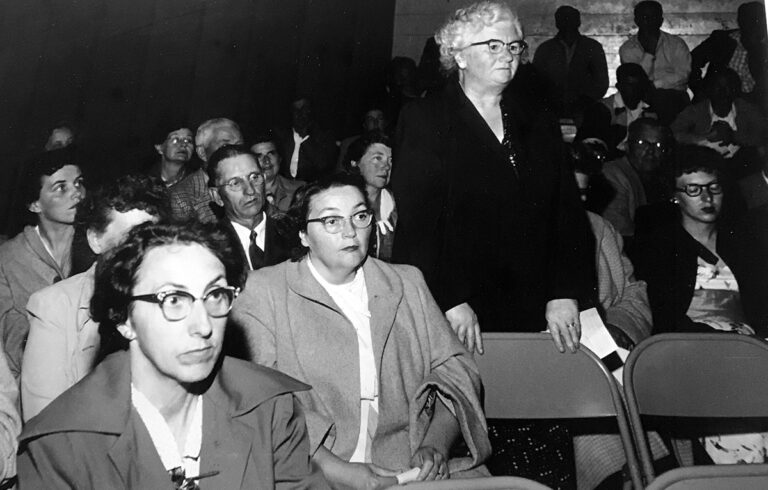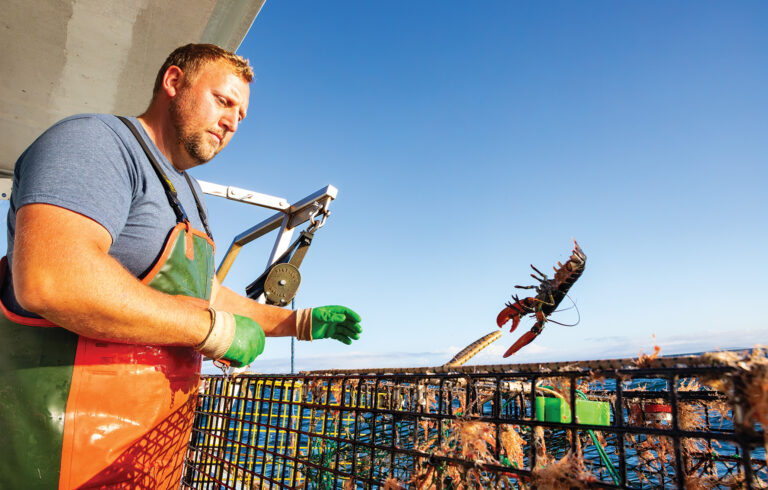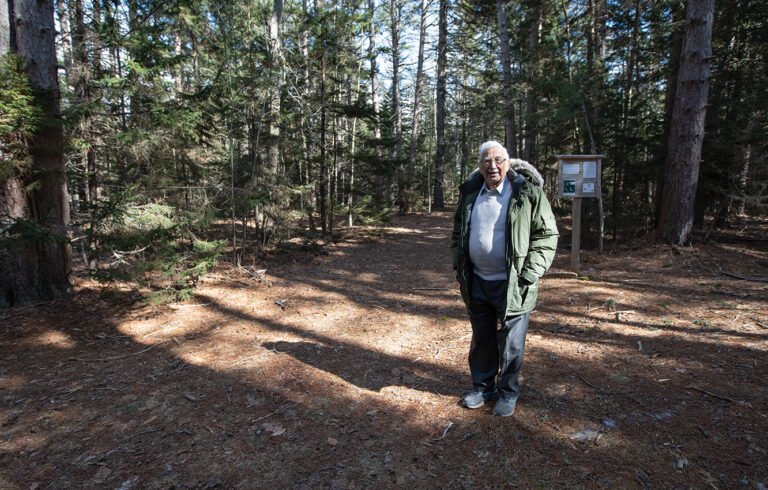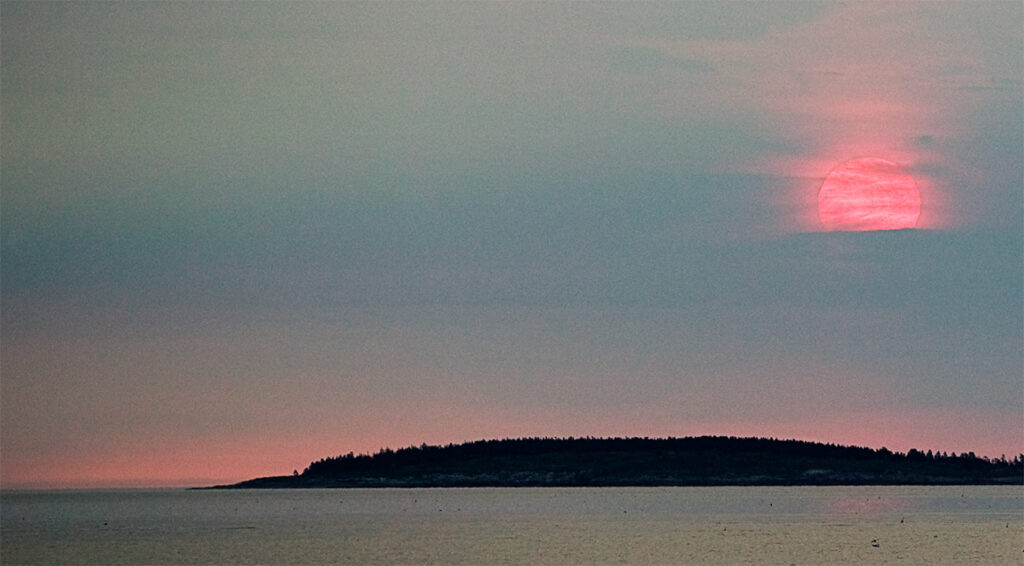
Doesn’t matter which island you’re from or headed to, it’s always The Island. My island was and is and always will be Gotts Island. The one Ruth Moore was remembering when she talked about the place you were homesick for even when you were there. I’d been back and forth out to the island since I was one, and could fit easily into the old wooden lobster trap my father had fashioned into a train engine. But for a time, when I was a fisherman and a builder, I came back to live a life I had only visited before. For a time, the island was home.
The winters I fished offshore with Dickie aboard the deborah-jayne I lived ashore in Bass Harbor, and the closest I got to the island was on our way out and then again on our way in from hauling gear out around Mount Desert Rock. That first year Dickie got a new radar unit installed aboard the deborah-jayne. He’d switch it on for the runs out and back in the dark, but he’d always step out from the shelter to mark the mid-channel buoy as he lined up to come in under the lighthouse, and he always kept one hand on the spotlight, scouting the waves.
“Thing of it is,” he’d say, “days when the wind’s up and you want to get home, you can’t open her up, and on days when you can open her up, why, there’s no hurry to get home.”
On those few calm evenings after we’d stopped in the lee of the little island to scrub her down before the last 11 miles of open water between us and home, he’d shut her down to unhook the belts. Dickie wore earplugs all day, but I was always nervous in all that silence and her oddly purposeless rocking. The big Cummins diesel stunk when the wind blew the exhaust back in on us. I just pulled my watch cap down tight around my ears and stayed outside as long as I could stand it. That sudden quiet was unnatural. It made me remember.
Dickie was always quick to switch her on again. Then, cradled by that throbbing beat, he’d look over quick at me and smile and I’d know he felt the same relief as me. But all he said was, “No sense using that fuel for nothing.”
Dickie’s wife, Gwen, said he wore a groove in the cement floor down beside his basement workshop. Pacing back and forth. Listening to the weather forecast, trying to decide if today was a day out or not. Lots of days we’d be the only boat out of the harbor. All the rest of the boats left behind, chafing and bucking against their long, weed-beribboned mooring chains.
On this particular late-winter morning it was blowing more than half a gale, and thick-a-fog. I waited in the gravel parking lot above the wharf before dawn while Dickie brought the deborah-jayne in to the wharf to load bait for the day. I had so many clothes on, it was hard to get my arm up to wipe my nose.
Scotty pulled up in his new truck and rolled down the window. “Blowin’, ain’t it,” he said. “You fellas going out?”
“Yeah,” I said. “You know Dickie.”
He nodded.
“I got my gear out,” he said, “but I never got the coordinates. You know, for my new Loran.”
Today a personal navigation system will fit in your back pocket. Back then, a Loran unit as big as an industrial-size microwave needed to be bolted to the cabin roof, and fishermen entered coordinate data as they went.
Two hours later, about 20 miles offshore, I told Dickie about the conversation when he throttled back and circled to find the end buoy on the first string. His lips tightened in something like a smile.
On good days, Dickie would duck out through the canvas back of the shelter to line up his marks—the different peaks on Mount Desert Island and the low, dim features of the last islands. Today, he watched the wind and tide, glanced at the compass from time to time, and checked his watch. The end buoy of the string appeared out of the fog, its spindle all wrapped with the fat red bands we used to hold the lobsters’ claws closed.
That night, running in, Dickie smiled. “You know,” he said, “my old man used to say, all you really need is a compass, a pocket watch, and common sense, and there’s only one of those three that you can’t do without.”
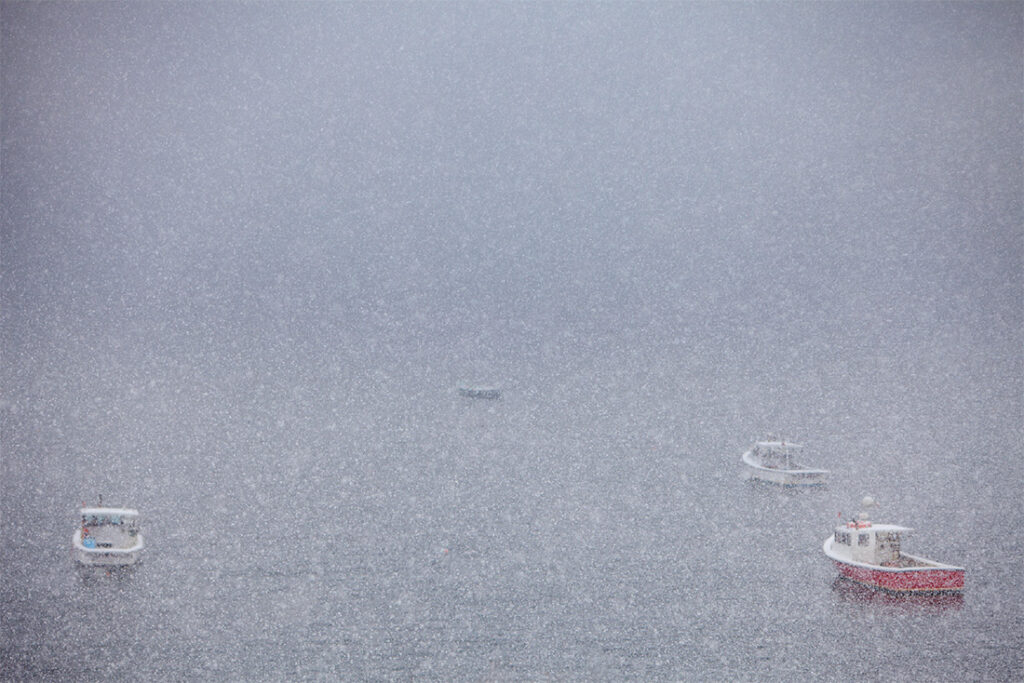
One morning when it was blowing like hell and no chance of a day out, Dickie came calling. He filled the doorframe to my little house by the wharf. It was a great house for a sternman. I could look out one window and see the boats and watch for Dickie’s truck rolling down to the wharf. I knew what was going on.
I was painting buoys, and they hung in rows from nails in the ceiling beams. I had a heap in the corner rigged with rope loops and spindles, and I was working my way through, painting on the blue stripes.
He leaned in as far as he could with his feet planted on the doormat, unsure about whether to take his boots off because he was coming into a house or walking right in because he was coming into a workshop.
“How long does it take you to paint one of those?” he called out, shoving his hat back.
Rather than painting simple blue bands around the buoy, I had gone for blue stripes that flowed up the length from base to nose in a graceful, curving swirl.
I looked at him framed in the doorway, square and bulky. Usually so poised and ready aboard the boat, but hesitant now.
“Not long,” I said.
Dickie scuffed his feet. “Most fellas would paint the blue around,” he remarked.
“Yeah,” I said. “Guess they would.”
We stopped there. This was getting as close to the great personal divide as Dickie and I would ever get. I was “from away,” he was Cranberry Island, born and bred, as many generations back as the island went. These shores and the dark, restless waters around them were home to him in a way only a few know home. I was an outsider blown in by the winds of change and chance.
My buoy color as listed on my lobster license was indeed blue-and-white. And most fellas would indeed paint a blue band around the base or the nose of the buoy and be done with it.
Dickie’s had a slim red band around the bottom end and three flared, red stripes on the base. They showed up good that way. His lines were perfect, never a wrinkle or a smudge.
“Les had stripes, you know,” said Dickie. “Black and white.”
Les was Dickie’s father-in-law, Gwennie’s father. The quintessential Downeast fisherman. Dickie had started out with him when he came back from his stint in the Air Force.
Les grew up out on Gotts Island, and I knew the stories. Him and his black cigarette boat running rum from boats offshore during Prohibition. The dresser he made Gwennie out of the oak of a shipwrecked vessel. Dickie told me about puking each day before he got aboard the boat, and how Les always dragged New Year’s Day when fish-dragging was a going thing. Give you luck all year, he claimed. Dickie carried the tradition forward. Mick told me about the time his grandfather climbed to the top of his mast during a storm and shouted out to God, asking if that was the best He could do.
“Skunk buoys, the other fellas called them, but Les never did give a shit what anyone said,” Dickie went on.
We stopped and considered that. Dickie grinned and I grinned back.
“Nobody ’round here ever took his colors,” said Dickie. He paused the barest beat and then went on. “Be a lot easier than them damn twirls of yours.”
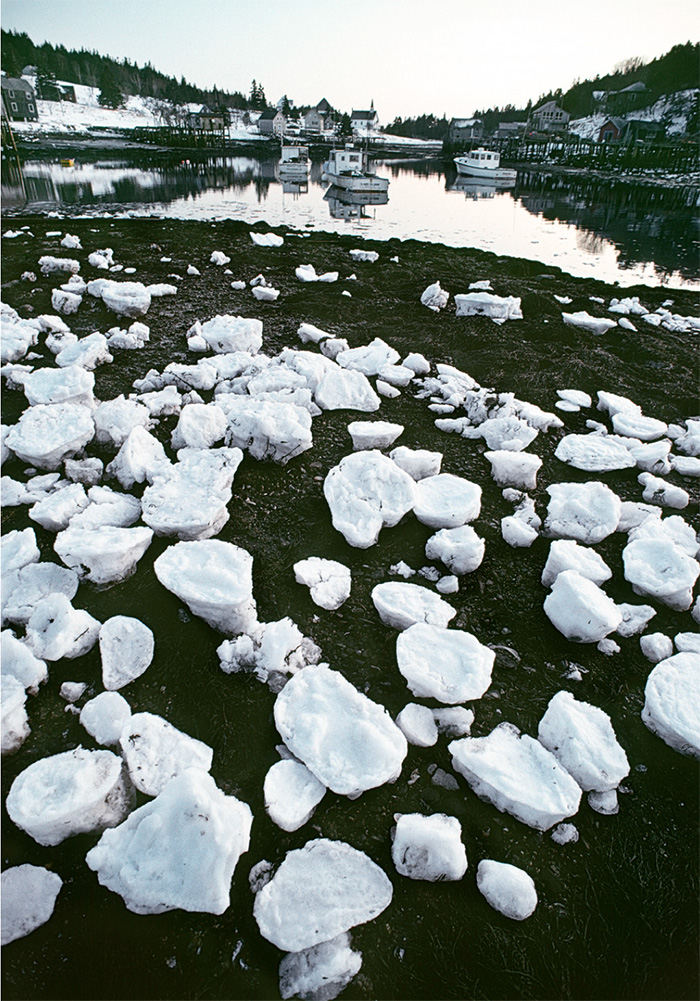
Must have been a month or so later, we were 15 miles offshore heading to the lee of the Little Island to wash down when Dickie idled back and let her come into the wind. He gave a quick smile and reached for the radio. I couldn’t hear a thing over the pulse of the diesel, but he always knew to pick up when Gwennie called.
Dickie held the mic in his thick white mittens. He nodded when he spoke as if she was right there with us. When he was done, he hung the mic carefully alongside the white VHF radio and tucked the coiled cord away.
“Gwennie says you’re to come to supper tonight when we get in,” he said, and spun the wheel to put us back on course for harbor and home.
We thumped up the back steps to the kitchen door, the only door anyone ever used. We took our boots off in the little entryway, and I made sure to line them up neat and square on the sections of newspaper she had laid down. We hung our layers on the pegs. Hat and poly vest, sweatshirt, sweater, flannel shirt, sweater vest. Our oil coats and bib overalls were left hanging aboard the deborah-jayne, but we still had plenty of layers to shed before coming in. I was six layers thinner and 40 pounds lighter when I walked in, quiet and careful, to Gwennie’s kitchen.
I was suddenly conscious of the wet sleeves on my sweatshirt and the deep and abiding oily tang of bait on my cuffs and the way my hair stuck up every which way after 16 hours under hat and hood.
Gwennie sat me at the table after I’d washed my hands and wouldn’t let me do a thing while Dickie went in to wash up. I watched her in the pantry, dishing up. Beside the sink and the old hand pump was her VHF radio. Mounted on the wall, the white mic hung carefully beside the receiver, the coiled cord tucked out of the way. Her window looked out onto the backyard. Her view was the apple tree out back and the little swing Dickie’d put up for Deborah or Jayne, the apple tree and the line of traps Dickie’d piled so neat and square from out of his workshop in the cellar below. The kitchen walls were lined with photographs and needlepoint and bright copper aspic molds.
We ate when Dickie got back to the table.
Gwennie asked how the day had gone.
Dickie talked of tide and wind and pounds sold.
Gwennie talked of roads and weather and who’d called.
“I’ll dish you some more,” said Gwennie, and filled my plate again. “Look at you,” she said. “Not enough meat on that long frame to amount to a thing.”
Dickie grinned and passed his plate for seconds.
You know what the doctor said, Gwennie reminded him. Dickie smiled but didn’t take his plate back till it was full.
There was Coca-Cola cake for dessert that night. I asked and Gwennie shared the recipe. Dickie got up and listened to the weather for tomorrow.
“Looks like we’ll get half a chance for the morning, Benjoy,” he said.
“Three o’clock?” I asked.
“Ayup,” he said.
I helped clear the table even though Gwennie told me not to. I watched her look up from the dishes in the sink and saw her reflection in the window. I imagined her reaching for the white plastic mic, calling out across the void. “Base to deborah-jayne, come back.”
I imagined her calling that night, the night Mick and I were lost. The night she called my parents and said we hadn’t come in. That all the boats were out searching. Imagined her listening to the wild chatter of waves and engines and voices calling out of the dark and the gale. Waiting to hear some word, any word out of the realm of icy dark and the deep and unforgiving sea.
I imagined her calling during the days when we were out far enough that we lay under the curve of the earth and out of reach. Imagined her trying again in the dark as we ran in toward the lighthouse’s beacon and the glitter of lights that marked the harbor. Heard her calling, “Base to deborah-jayne.”
And heard Dickie answer back. “deborah-jayne to base. Over.”
Money was tight that spring when I headed back to the island, and it looked to be a long time before there was any chance of a first paycheck.
I carefully went through my finances. Enough for groceries, seeds to start the garden, and 25 new traps if I scrounged the buoys, floats, and rope off the shore and bought the paint from the back of Reed’s Store, where they had the discontinued colors on permanent special. The year before I’d bought two quarts of coral, thinking white-sand beaches, and found out coral was pink.
There was enough, but only just.
Mick gave me a ride to the trap mill where they sawed out oak for trap stock.
On the walls they had patterns for all the fishermen in the harbor. The sills were marked for the placement of the bows and rungs, with each name in bold black letters. The patterns were passed down from father to son, from back when they fished out of peapods and Friendship sloops. G. Dow, E. Higgens, D. Phippen, C. Gott, B&P Gott. Berlin and Paris Gott had been dead for years but their pattern for gear lived on. Some sills were 36 inches, some 38. The Blacks fished 48-inch gear. Each fisherman had a personal and deeply held theory about the proper design for traps. They spaced the bows just so to divide the trap into the parlor and fishing sections. They knit the heads to specific lengths to lead the lobsters in and keep them there.
Back then we fished half-round traps because they were easy to roll on the gunnel and dump the sea urchins out. A few years later urchin roe became a major export to Japan. In less than a decade the sea urchins were gone. In the same ten years that the sea urchins vanished, wood traps went as well.
But that spring morning, as we waited and the saws screamed through the logs, the world was bright with promise. The air was sharp with the smell of cedar and green oak, cigarettes and bitter coffee. When it was break time we shuffled through the wet sawdust and I asked how much stock for 25 traps would cost.
It was close, but more than I had. The bows were the expensive part. They took time to steam and bend and shape. Each trap had three bows of inch-square oak. They added up.
“Maybe I should just get fifteen traps,” I said.
“Oh, don’t,” said Mick. “Cut your own bows. That’s what my grandfather did. Just went out in the woods and cut spruce for bows.”
“There’s all kinds of spruce out on the island,” I said.
“No shit, Sherlock,” said Mick. “Let’s load the wood.”
“Cut your own bows?” said Dickie the next day. “What you want to go and do that for? All that new oak and you want to use spruce for bows.”
“Yeah,” I said. “But—”
“Morris’d give you wharf credit; all you got to do is ask.” Dickie shook his head, then he let it rest. “We can run that trap stock out to the island for you, on the high water before we haul. You got to save your energy for cutting all that spruce for bows. You have any idea how you’re going to bend them?” he asked.
I hadn’t got that far in my thinking. Actually, I had just figured I’d cut the trees small enough so I could bend them right over by hand.
Later that spring, when I was back on the island and the sap was rising and the spruce saplings would bend, I headed out to cut spruce. There were all kinds of spruce out there; thing of it was, it had to be just the right kind of spruce tree for me to use. I got two sections of bow out of a tree before the tree became either too thick or too thin to use. It took most of a week to cut the trees, trim them, haul them down to the shore, and bend them into the sills.
In the end I had 25 traps, each with three shaggy but serviceable bows. The traps looked misshapen and lumpy, and Mick laughed every time he saw one.
“Good thing you haul by hand,” said Dickie. “If you used a hauler you’d yarn the bows clean out of them traps.”
But they lasted. I fished them along the more-sheltered shores, out of storm surges and swells. The resins in the wood kept out the marine worms that bored through oak in a season. After eight years I was still fishing most of them.
The year I cut spruce for bows, Dickie bought his first 50 wire traps.
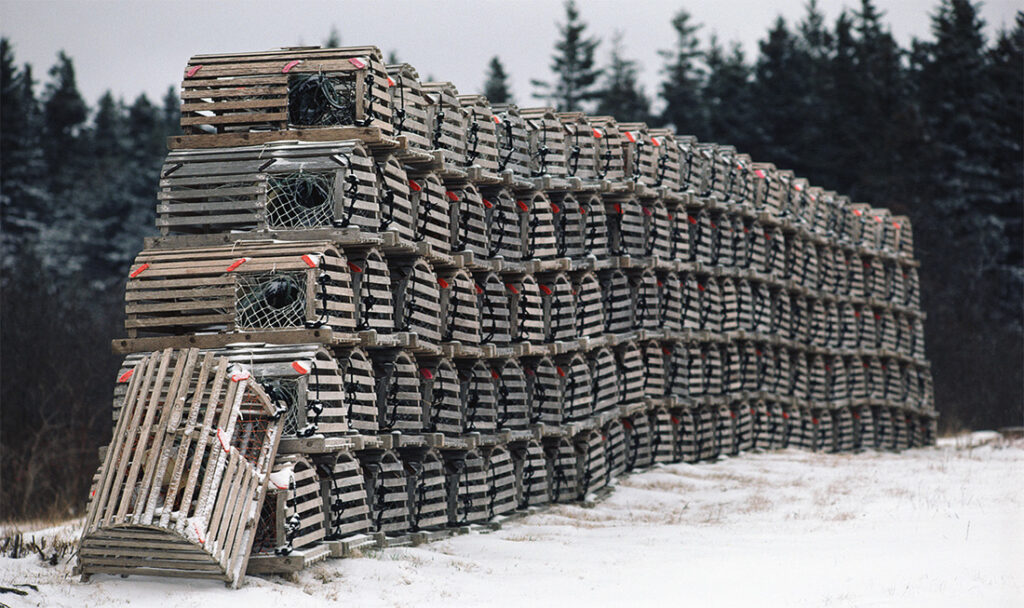
The last year I fished, my brother and I built a log house out on Little Gotts Island. The walls of the cabin were three logs high on the day Rooster drowned.
Out on the little island we didn’t have much of a clue about what was happening on the big island, let alone over in the harbor. We talked notch and log and fit at break. With the chain saws and the little generator going, we never bothered to put a radio on. We had a view that looked out to eternity but never bothered to look over the horizon.
The island was enough, and more.
That day was low and gray, warm enough and not much of a wind, but there was an odd restless pressure and the air was hot and heavy when we worked and chill when we stopped. The surge murmured and swept along the ledges below, and along the headlands a shimmering salt haze hung like a vague curtain between land and sea.
“You hear that?” asked Andy when we stopped to file the chains and sharpen chisels and gouges.
“What?” I hollered, and then remembered to pull my ear protectors off.
The helicopter was low, and the whir of it faded and rushed back on the wind as it circled. A plane came in low, banked, turned, and made another pass. I looked out to the southward. No boats worked the lines of traps that followed the shorelines and sunken ledges. Usually there were plenty of them rushing to the next trap, circling then as they hauled it back and tended it, then rushing on.
“I wonder what’s up?” said Ben.
PK went to the cook shack and flipped on the VHF radio. We heard the crackle and static hiss and voices calling out over engines.
He came back out and shaded his eyes. “They’re looking for someone. Two guys had to jump off a lobster boat, just over by Plasench. There was a fire. One made it to shore. They’re asking anyone who can to walk the shore, just in case.”
We walked the shores all around the Little Island. When we came around the north point we could see Plasench and the boats going ’round and ’round in the long channel between the islands, where the tide runs strong enough to pull the big green can buoy nearly underwater at the peak of the ebb and flood.
The planes and helicopter flew in low along the shores, then out where the bay spills into the wider gulf, then banked and turned back.
We walked the shore and felt the deep chill of the dark water rising to make a small fog along the margin of seaweed-hung boulders and ledges. We walked until shadows thickened and the planes and boats and choppers gave it up.
The divers found Rooster the next day.
He was one of the young fishermen working to rise up from the ranks of the mosquito fleet. He’d stopped alongside me when I was hauling to chat or drink a beer, bum a smoke, but really to check me out and see if I was on to them that day, try and gauge the level of lobsters in my baskets under their cool blankets of kelp. Our buoys marked the same shorelines. We kept tabs on one another.
Down at the wharf the old-timers held forth on the dangers of gas in the bilge.
They each remembered teaching Roost to build a trap or run a boat or paint a buoy.
“If it’d been me, now, well, I’da stayed with the ship,” Georgie piped up from the battered, black seat out of Morris’s old Caddy.
“ ’Course you’d stay aboard the goddamn ship, Georgie. You can’t hardly get out of that seat lest we tip you out,” said Skipper.
I wondered about it on the run back out to the island. I still wondered about it as I walked up the hill alone. Sat on the back steps and stretched my feet and wondered some more. On gray days when the air is neither warm nor cool, when the wind shifts and wanders, I get a restless feeling and wonder yet.
You go along and go along and go along and then, all of a sudden, it all changes—in a heartbeat—and nothing is ever the same again.

